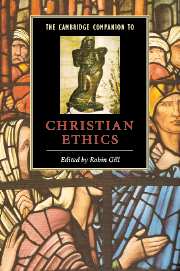Book contents
- Frontmatter
- Part I The grounds of Christian ethics
- Part II Approaches to Christian ethics
- 6 Natural law and Christian ethics
- 7 Virtue ethics
- 8 Gender and Christian ethics
- 9 Liberation ethics
- 10 Christian ethics
- 11 Other faiths and Christian ethics
- Part III Issues in Christian ethics
- Select bibliography
- Index
6 - Natural law and Christian ethics
from Part II - Approaches to Christian ethics
Published online by Cambridge University Press: 28 May 2006
- Frontmatter
- Part I The grounds of Christian ethics
- Part II Approaches to Christian ethics
- 6 Natural law and Christian ethics
- 7 Virtue ethics
- 8 Gender and Christian ethics
- 9 Liberation ethics
- 10 Christian ethics
- 11 Other faiths and Christian ethics
- Part III Issues in Christian ethics
- Select bibliography
- Index
Summary
ORIGINS
Themes akin to natural law emerged in Greek civilisation. The tragedian Sophocles (497-406 bce), for example, gave some indication of it in his depiction of the conflict between Antigone's obedience to King Creon and her stronger obligation to a higher law. Plato (428-348 bce) countered the relativism of the Sophists by arguing that goodness consists in living a life in accord with our rational nature and not in thoughtless social conformity. Aristotle (383-322 bce) followed suit in distinguishing the deeper 'natural justice' from what is legally just. For Aristotle, the good for every organism is 'to attain fully its natural activity'. Living 'according to nature' (kata physin) for human beings means living virtuously.
The cosmopolitan Stoics distinguished the human nature that pertains to all human beings as such from laws instituted by particular societies. They held that the right way to live can be discovered by intelligently conforming to the order residing in human nature. Their characteristic maxim – that we ought to live ‘according to nature’ – was an injunction to live virtuously rather than at the whim of fluctuating emotions or social approval.
- Type
- Chapter
- Information
- The Cambridge Companion to Christian Ethics , pp. 77 - 95Publisher: Cambridge University PressPrint publication year: 2000
- 2
- Cited by



